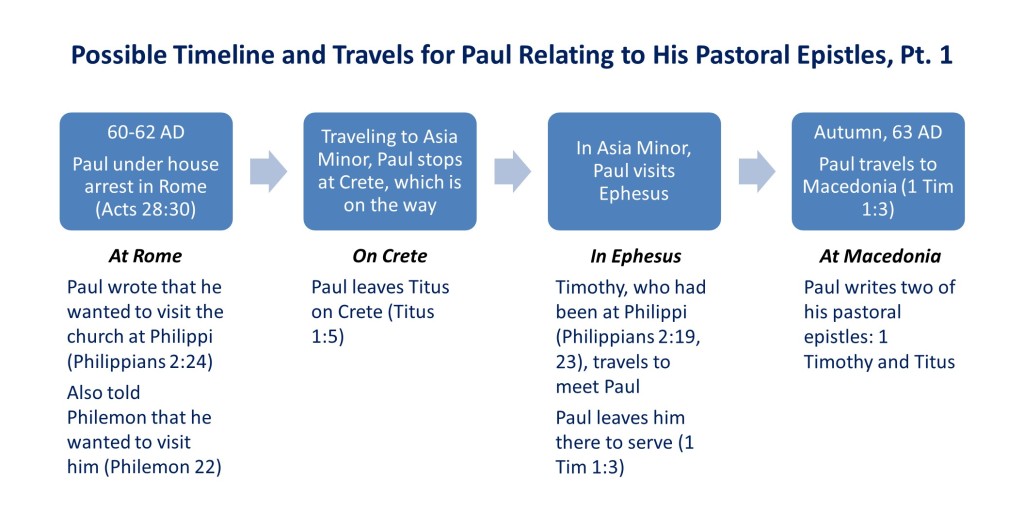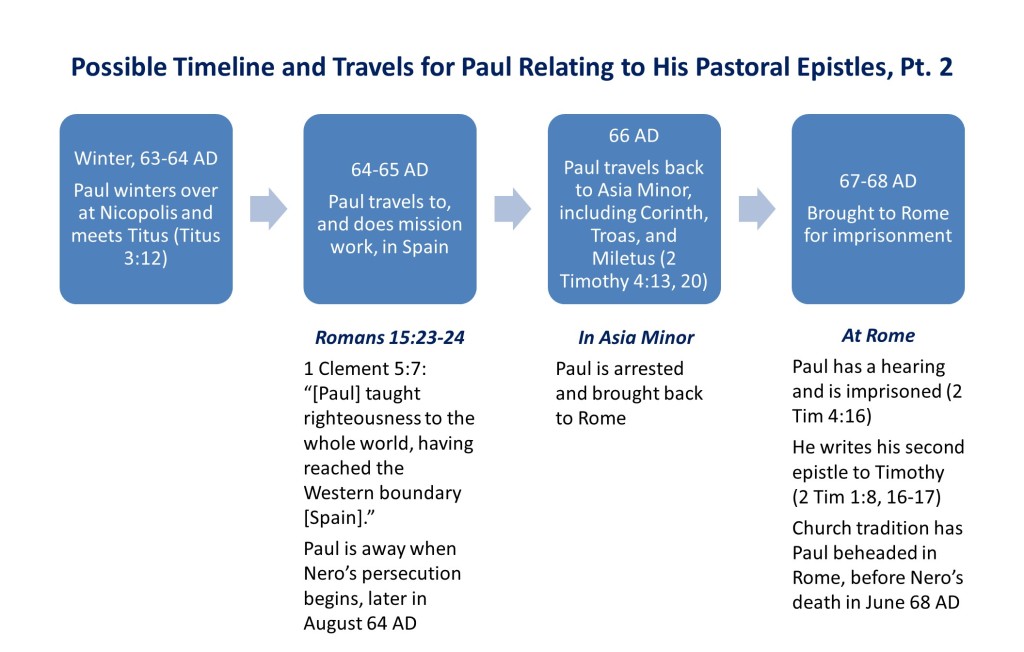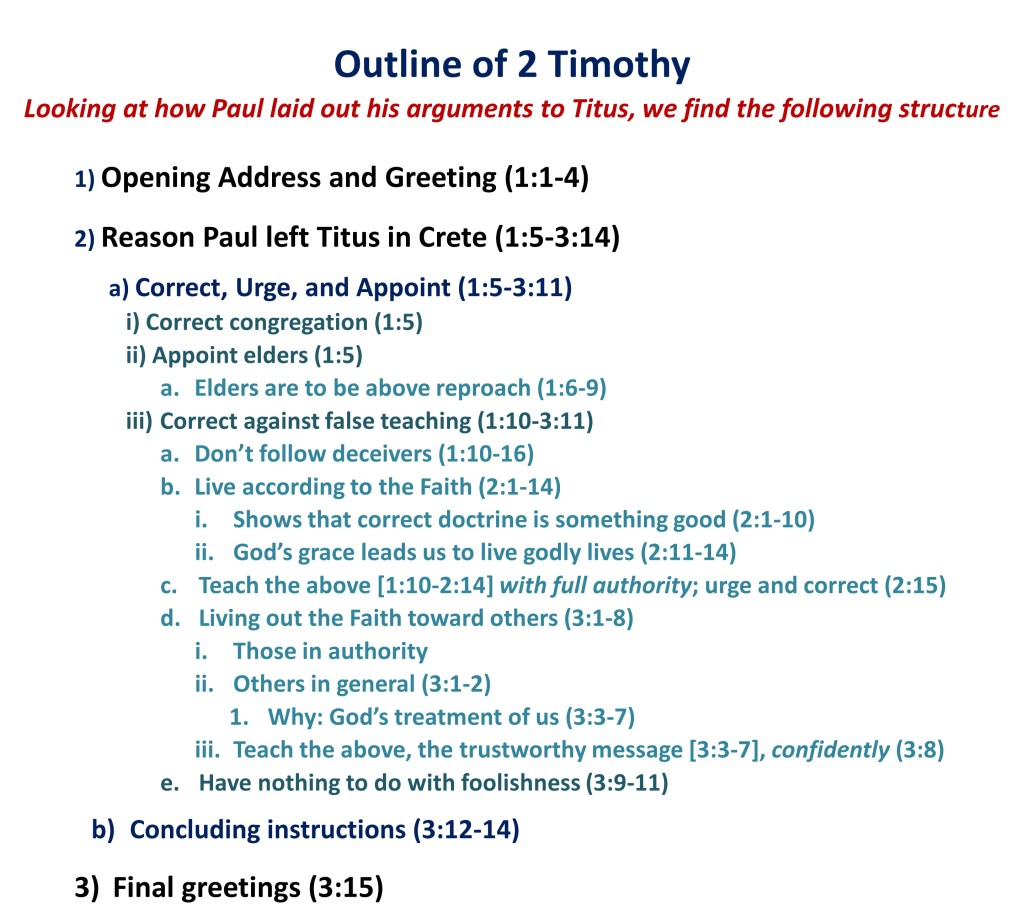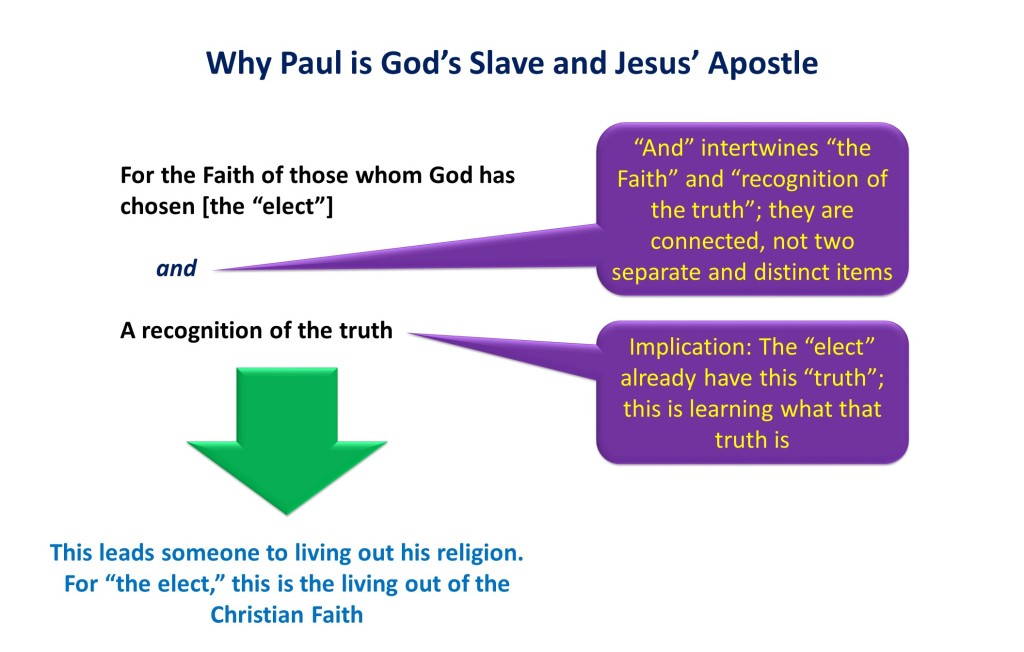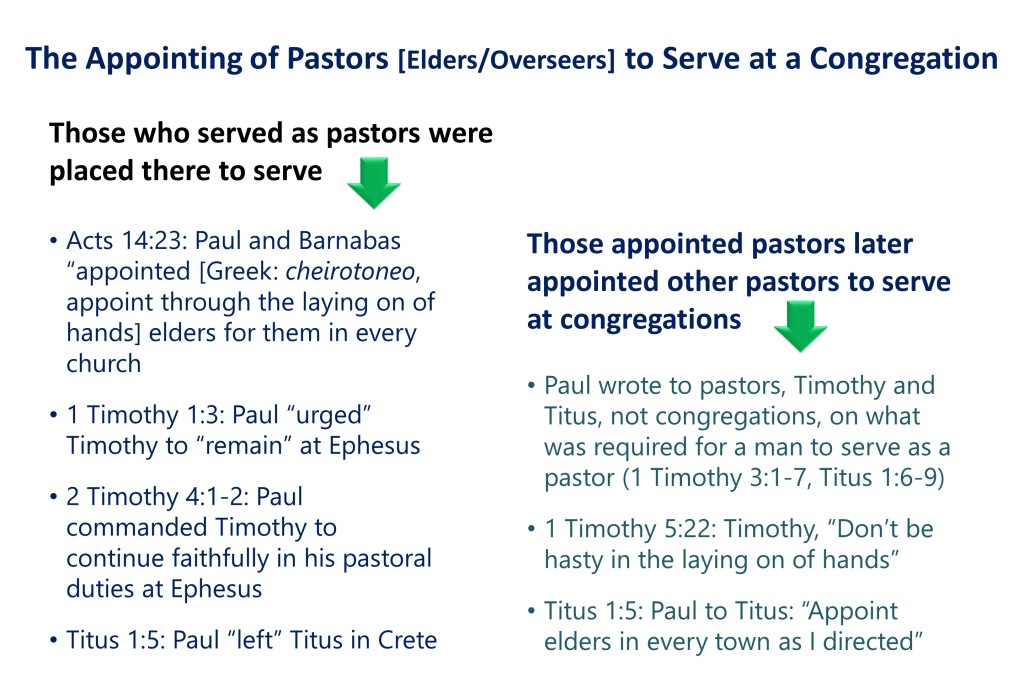 Titus is one of, what we call, the “pastoral epistles.” They were letters from the Apostle Paul to pastors Timothy and Titus, who were under his charge.
Titus is one of, what we call, the “pastoral epistles.” They were letters from the Apostle Paul to pastors Timothy and Titus, who were under his charge.
Authorship
In the early 1800s, some began to challenge Paul’s authorship of the Pastoral Epistles. Why? First, the rest of the New Testament does not confirm Paul’s travel itinerary mentioned in the three Pastoral Epistles. Second, the subject matter of the Pastoral Epistles is different from Paul’s other letters. Third, we find some differences in the original Greek between the Pastoral Epistles and Paul’s congregational letters. The Pastoral Epistles have some characteristics of Luke’s writing, which have led some to decide that Luke, not Paul, wrote the Pastoral Epistles.
Your pastor believes that this is much ado about nothing. When Paul traveled, he usually had a traveling companion, whom he often used as a scribe, co-author, or editor. So, it wouldn’t be unusual for Paul to use Luke as an editor for his Pastoral Epistles, if Luke had traveled with Paul.
Further, Paul wrote the Pastoral Epistles to individuals who were pastors, not congregations—so they should contain different content. As for the rest of the New Testament not confirming Paul’s travel itinerary found in the Pastoral Epistles, below is your pastor’s reconstruction of Paul’s travel in his last few years of his life.
Literary Structure and Style of the Titus
Although a personal letter, Paul modeled Titus after official Government memoranda or appointment charters of his day. Titus would have recognized that, and so he would have received the letter in that way. This means the form of Titus also carried meaning: It was personal—but also official correspondence—and was to be received and treated as such.
Paul wrote Titus following a mandata principis structure, a letter through which a ruler issued private commands or instructions to a subordinate. So, it’s not strange that Paul would give gave many commands and list many duties for Pastor Titus.
Since Paul wrote Titus to a pastor, he often abbreviated points that he made in a way that he didn’t do in his congregational letters. Paul used “enthymemes,” which were statements that left elements or underlying premises unsaid.
Outline of Titus
Opening Greeting
Read Titus 1:1
- Paul says that he is a God’s servant (slave) and an Apostle of Jesus Christ. What does this imply about what he write to Titus?
“God’s elect”: Those whom God has chosen to be His people. The New Testament use of “elect” is grounded in, and grows from, the Septuagint’s use of “elect” as Israel being the elect people of God. Although we don’t find the phrase, “God’s elect,” in the Old Testament, we do find “My elect” of “His elect”: Isaiah 42:1; 45:4; 65:9, 15, 23 (LXX, “My elect”; MT, “they”); Sirach 46:1, 47:22.
- For what two reasons does Paul see himself as a slave and an Apostle?
“knowledge”: Koine Greek has many “knowledge” words. Gnosis was used to refer to knowledge in general. This verse has epignosis, which refers to recognizing something that someone already has. (What is interesting is that the New Testament uses epignosis when it refers to conversion. This implies that objectively, salvation already belongs to someone, the “gnosis” part of epignosis. However, subjectively, salvation becomes one’s own when one recognizes what he has, the “epi” part of epignosis.)
“godliness”: Greek, eusebeia. “God” (theos) is not part this word. This is the living out of one’s religion.
Read Titus 1:2
- What is the hope for God’s elect?
- If God does not lie, how sure are His promises?
- From an eternal perspective then, when were the elect saved?
Read Titus 1:3
- How did what God objectively did “before the ages began” get subjectively applied to someone?
- Why is Paul authorized to preach?
- What are the implications of Paul being entrusted “by the command of God our Savior” to preach for: 1) the preacher and 2) the hearer.
Read Titus 1:4
- If Paul and Titus have a “common faith,” what does that say about differences in how people understand the Christian Faith?
- Who is the source of grace and peace?
- But through whom do we receive that grace and peace?
Why Paul Left Titus in Crete
- If Paul “left” Titus on Crete to serve as pastor, by whose authority was he serving as a pastor?
- For what two reasons did Paul “leave” Titus on Crete?
Excursus: Paul “Left” Titus on Crete; Titus is to “Appoint” Elders
“appoint”: Greek, kathisthami, meaning “appoint” or “put in charge.” This focuses on what was taking place, not the how it was done (by the laying on of hands).
In our polity, a congregation “calls” a pastor to serve it. Although Scripture does not forbid this practice, when we read Scripture, we will not find a single pastor serving a congregation because the congregation issued him a “call.”
In the Pastoral Epistles, Paul doesn’t command any particular form of Church government. What we do find, however, is Paul operating within an already-existing Church structure. In this structure, pastors are appointed (do not confuse this with deacons [Acts 6:2-6], nor the Apostles casting lots to replace Judas [Acts 1:26]). We see pastors appointed in Acts, 1 Timothy, and Titus.
For a man to become a pastor [elder, overseer], he must have certain characteristics and qualifications. We’ll go over that in next week’s lesson (also covered in 1 Timothy 3:1-7). The New Testament shows us that a man didn’t become a pastor until hands were laid on him, “ordination.” This was done by fellow pastors, which included the Apostles when they were still alive (1 Timothy 4:14 and 2 Timothy 1:6). A pastor then served where he was appointed.
In Christ’s Church, what God has made known in the Scriptures is to be normative for us (that’s the Reformation principle of “sola Scriptura” at work). So, what does Scripture show about how we are to have pastors who serve us? What Scripture shows us is not what we practice.
In the LC-MS, we’ve taken a polity forced on us because of an “emergency situation” and made that the norm. If a congregation is forced to call a pastor because it has no other option, then the principle of adiaphora (something neither commanded nor forbidden) allows the congregation to do that because it must. However—even if something in not commanded in Scripture—Scripture is still to be the “norming norm” in our life with God.
With Scripture norming us, here is what your pastor recommends (yes, this would require a constitutional and bylaw revision).
- Right now, the default position is that it is the congregation’s “right” to call a pastor. Although Scripture does not forbid such a practice, neither does Scripture allow it. That’s because this is a practice you don’t find in Scripture.
- When Scripture shapes our practice, however, within our current polity, a congregation’s default position should then be for the District President to choose and appoint the congregation’s pastor.
- Only if the congregation is convinced that the District President is a false teacher should the congregation then be “forced” to issue a call on its own. This is the proper use of adiaphora for the sake of the Gospel.
